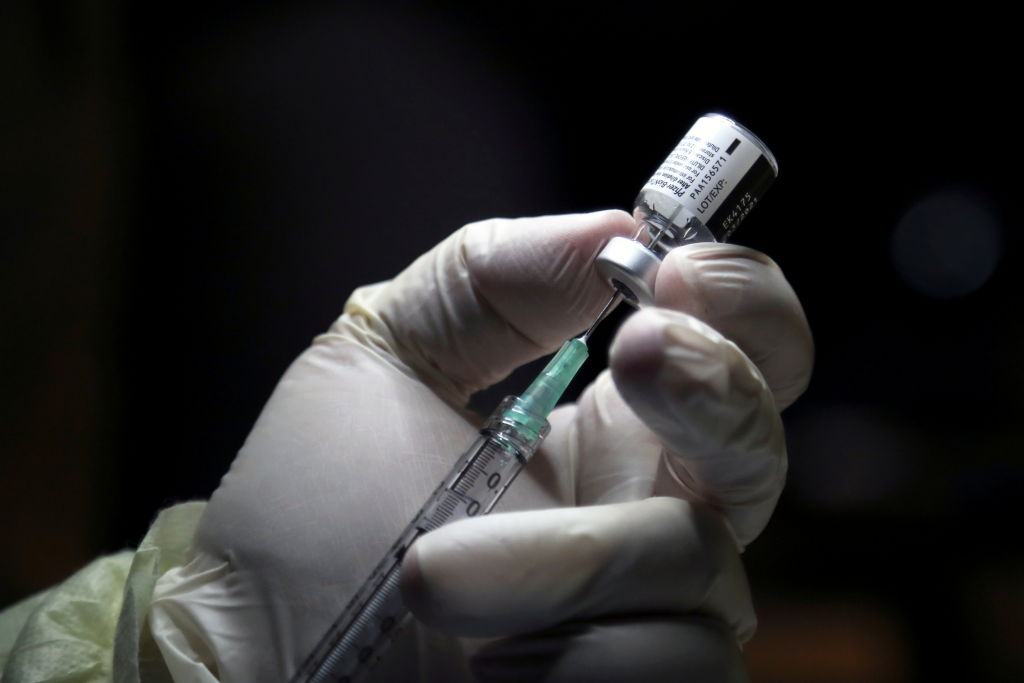Additional age groups are now eligible to receive the COVID-19 vaccine in the London area, local health officials have announced.

As of Tuesday, people aged 65 and older, and those who are turning 65 this year, are now able to book an appointment to receive a vaccine at a mass vaccination clinic in London-Middlesex and Elgin-Oxford.
In a statement, the Middlesex-London Health Unit and Southwestern Public Health said the move was a result of several factors, including strong vaccine uptake, increased supply of doses and recent news that the province’s pharmacy vaccine project would expand locally.
The news comes roughly a week after eligibility expanded to people aged 70 to 74, and two weeks after eligibility expanded to people aged 75 to 79.
In a tweet Tuesday morning, Dr. Chris Mackie, the region’s medical officer of health, said vaccine eligibility would move to those 60 to 64 “as soon as we can, likely within a week.”
In a separate announcement, the province said Tuesday that the Elgin County postal code N5H was among dozens of postal codes in 13 public health units that would see increasing vaccine allocations as they are considered provincial hot spots.
The province said people 50 and older who live in the specified postal codes — of which N5H, centred around Aylmer, Ont., is the only one in the London area — would be able to get vaccines in the coming weeks.
- After controversial directive, Quebec now says anglophones have right to English health services
- Something’s fishy: 1 in 5 seafood products are mislabelled, study finds
- Why non-alcoholic beer is gaining steam at Oktoberfest: ‘Nobody will judge you’
- Recall expands for Nutrabolics vegan bars over undeclared milk
https://twitter.com/Healthmac/status/1379451935951052803
Eligible residents are asked to visit the area’s vaccine booking website or call 226-289-3560 to book an appointment. Online appointments are encouraged due to the high call volume.
More information on eligibility can be found on the MLHU’s website.

Get weekly health news
Health unit data shows roughly 95,000 vaccines have been administered locally so far, averaging between 2,000 and 2,200 shots per day.
The region has recorded at least 515 cases just since April 1, or about half what was recorded during the entire month of March.
The rolling seven-day case average for London-Middlesex stood at 100 as of Tuesday, up from 51 the seven days previous.
During Tuesday’s scheduled MLHU media briefing, Mackie said about 11,000 doses of the Moderna vaccine would be arriving locally in mid-April along with another 8,000 in late April, but noted the amount is still not enough to allow the region’s three vaccination clinics to operate at full capacity.
Late last month, Mackie described the local vaccination strategy as “earn and burn,” where the health unit is doling out vaccine quickly or quicker than it’s arriving.
Vaccine supply limitations have also continued to delay plans to open a fourth mass vaccination clinic in London-Middlesex.
“It’s predictable, it’s not perfectly stable,” Mackie said of planned vaccine shipments.
“The number of Pfizer doses we’ll be receiving over the next few weeks actually goes down a bit from around 13,000 to 11,000. But we are receiving more Moderna doses than we are losing in Pfizer doses over that time.”
Mackie said he was not concerned about the province diverting doses from low- and medium-activity regions to areas considered hot spots, noting the province has already done that.
“The 13,000 down to 11,000 is primarily so that there is more central strategic reserve for the province so that they can redeploy to places that need it,” he said.
“As we vaccinate people in Toronto, that helps protect people here. If we can end the pandemic there, that will make a tremendous difference here. We’re all connected in so many ways that I don’t see that as a concern.”
During the briefing, London Mayor Ed Holder noted he had reached out to Premier Doug Ford to push for more AstraZeneca vaccines to be administered at local pharmacies as part of the province’s ongoing pilot.
“As of today, we have only two pharmacies providing AstraZeneca in London. Guelph has twice that many,” he said, adding that Hamilton has 10 participating pharmacies and Waterloo Region 18.
“Given our size, the fact that we have just two is not acceptable. It is my hope we will receive some positive news on that front in the coming days.”
There have been increasing calls for the province to prioritize and vaccinate more front-line essential workers, such as education workers and those in factories and warehouses, amid a rising number of variant cases and younger people becoming infected and hospitalized.
Mackie said he wished there was more vaccine to immunize everyone, but likened the current situation to one of “robbing Peter to pay Paul.”
“Peter is experiencing 97 per cent of the deaths in Ontario. Ninety-seven per cent of the deaths in Ontario are in people over the age of 60,” Mackie said.
“The number one goal of any pandemic response is to prevent deaths. We should be targeting those who are at highest risk of death or those who care for them. That’s what the campaign is doing right now.
“Those decisions happen at the provincial level, we can’t change them at the local level, but we do support them because of that focus on deaths.”
More information on the local vaccination campaign can be found on the MLHU’s website.

















Comments